In the last week of March, Catalyst for Peace and our partner Fambul Tok moved further towards partnership with the Ministry of Local Government and Rural Development in Sierra Leone to help grow inclusive governance throughout Sierra Leone. Together with Ulster University, CFP, FT and the Ministry convened a gathering in N. Ireland to imagine and think through how to design and operationalize a national policy that would support a truly community-owned and led peace and development planning process. The planning process would cascade across Sierra Leone and build on the inclusive governance work CFP has been supporting with Fambul Tok, which includes the People’s Planning Process (PPP) and Inclusive District Committees (IDCs) — District level platforms to support the People’s Plans and provide space for all District stakeholders to work through challenges that impede effective peace and development activity.
Over the last two years, Catalyst for Peace and Fambul Tok have been intentionally going beyond implementing the community level PPP to also work with government offices at the district level in Sierra Leone. In the last six months, to keep up with the demand to grow the PPP and IDC process beyond the three districts we are currently working in, we have been expanding our partnerships further to work with the National Government through the Ministry of Local Government. We are working towards the end goal of a whole–systems (nation-wide) approach to inclusive governance, which supports local initiative for peace and development.
Having resisted working with the government through 8 years of post-war reconciliation work, this has been an important learning curve. The heart of our work has been inviting ordinary people, in the communities where they live, most of whom have been marginalized by formal political structures, into their full capacity and leadership for community healing, empowerment and development. We have worked with Fambul Tok to develop processes and platforms that invite voice and create spaces to nurture voices that have never been invited into public, decision-making spaces.
The Ebola crisis was the catalyst to reach out to government – first to help build bridges to the communities for the Ebola response, and later to make sure that the recovery process was not repeating the mistakes of the post-war recovery, but was fully community centered. Having piloted the PPP at the community level, we shared that work at District development stakeholder conferences we hosted with Fambul Tok, and the Inclusive District Committees grew from there, and became partners in working toward an inclusive, coordinated, community-centered process of addressing Ebola and its aftermath. Having piloted PPP and IDC work in three districts, Fambul Tok and CFP reached our capacity – but demand kept growing. The Ministry of Local Government Rural Development, headed by Minister Maya Kaikai, joined us in hosting the Inter-District Learning and Growing Inclusive Governance Conference last November. Following the conference, we hosted a national Roundtable together in Freetown in February, on Growing Inclusive Governance through the People’s Planning Process. Both of these events explored the Government’s involvement in creating a national process that would support the community-centered planning and platforms for peace and development, building on the PPP and IDC work to date.
That brings us to Belfast in March. Staff from CFP, Fambul Tok and the Ministry, along with a Member of Parliament, Mayor and District Council Chairman from Sierra Leone and international consultants convened in Belfast to gather the important perspectives of political functions and governance structures, governmental technical expertise, process expertise of the People’s Planning Process and IDCs, as well as technical expertise on national frameworks, all together in one place. Sadly, three members of the Sierra Leone contingent were refused visas by the UK government, and we missed out on the voices of representatives from two Inclusive District Committees who would have made critical observations and contributions reflecting District and community perspectives.
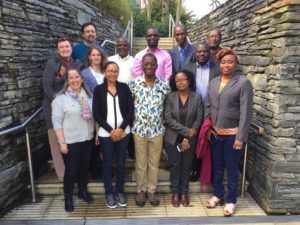
Our goal for the week was creating the process to design a “National Framework” to support people-led planning for peace and development and further implement the government’s efforts towards devolution, building on the lessons of the PPP and IDC work to date. The National Framework would describe the people’s planning process and platforms to support its formation and implementation. It’s a document that would need to be written and receive input and feedback from stakeholder groups throughout the country. Since we were building on work already tested in three districts with inclusive input from communities, we weren’t at ground zero with the consultative content of the National Framework. However, it would need to be a policy document that was broadly owned and very clear. As a group, we needed to see ourselves in the big picture with all of the stakeholders, to get clear about what we were doing, discern what it would take to gain broader support for the National Framework at the government level, and decide who would do which roles to move us forward.
We met in both Belfast and at an island retreat center called the Lusty Beg. Our short week together was full.Brandon Hamber, Ulster University Professor and international consultant to CFP and Fambul Tok, hosted us and arranged an introduction to N. Ireland and its experience with conflict. He also organized a meeting with the Irish diplomatic community and governmental and non-governmental organizations in N. Ireland that work to address the aftermath of violent conflict and its current manifestations. We packed the rest of the time with intensive meetings and additional conversation over large meals. 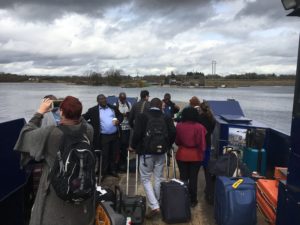
Some of the important things that happened during our time together were developing relationships; a commitment to “Frank Talk”; wrestling with the complementarity of platforms created through Fambul Tok’s inclusive governance work and existing legal governance and development structures; developing an in-depth understanding of national frameworks and putting the work in global context.
Getting to know each other was a key objective and outcome of our time together. Although a number of us knew each other well, several people had gotten involved in this work at different times and some participants had not met each other or had opportunities 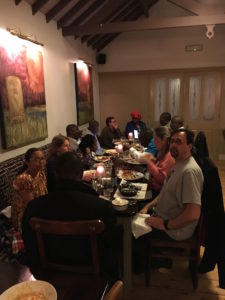 for interaction. A long layover in the Amsterdam airport ended up being of great value in relationship development as the Fambul Tok Staff and government representatives (who were from different parties) got to discuss and laugh together at the McDonalds. Our meals together, travel from Belfast to the conference center; tour of Belfast’s conflict story; and other meetings and events provided venues to get to know each other and build relationships.
for interaction. A long layover in the Amsterdam airport ended up being of great value in relationship development as the Fambul Tok Staff and government representatives (who were from different parties) got to discuss and laugh together at the McDonalds. Our meals together, travel from Belfast to the conference center; tour of Belfast’s conflict story; and other meetings and events provided venues to get to know each other and build relationships.
Our shared commitment to Frank Talk came from the value and practice in all of Fambul Tok’s work to invite people to share with each other openly and respectfully regardless of status, comfort and propriety. Fambul Tok means Family Talk in English and signifies an open way of being together and discussing important matters. In order to work through differences and grievances, it’s important to start with where people are in order to move forward. This began to happen as we worked through stereotypes of government and NGOs – both perceived to value self-interested above the common good; and between government parties (both the ruling and opposition parties were represented).
In order to get on the same page, we also had to come to terms with the legal and inclusive gov. “platforms” that Fambul Tok had helped facilitate. This was an extremely important conversation in which we got u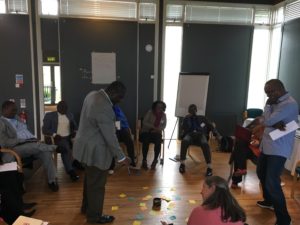 p, stood at the different layers of a model created on the floor of the different organizing and governing levels in Sierra Leone, moved around structures and internalized the possibilities and relationships. Ultimately, what we were devising with the inclusive governance work needed to complement what existed in order to continue to support decentralization and the effectiveness of local government.
p, stood at the different layers of a model created on the floor of the different organizing and governing levels in Sierra Leone, moved around structures and internalized the possibilities and relationships. Ultimately, what we were devising with the inclusive governance work needed to complement what existed in order to continue to support decentralization and the effectiveness of local government.
Angi Yoder-Maina, National Framework consultant, described a National Framework as a common document that in our case would describe the national planning process for people-centered development and its related platforms that the country was signing up for. It would be a document based on Fambul Tok’s Inclusive Governance work in three districts but would be vetted and modified through consultations throughout the government and country. It would result in a document much like what many of us know as a project proposal. It would include goals, objectives, values, operating guidelines and indictors of success. The process of developing and vetting it would include communication and coordination among stakeholders and get everyone on the same page. It would be a common document to share with donors who could sign on or choose not to. It would allow the needs of Sierra Leoneans to lead rather than external donors. It would also create a level of accountability among institutions in Sierra Leone by having a common document.
Finally, living into the story of N. Ireland helped us locate the work we were doing in the larger context of societies coming out of violent conflict. We toured Belfast with mural expert Bill Rolston, who condensed a complex history punctuated by current political/remembrance murals into a few hours. Ruairi De Burca, Irish Joint Secretary, hosted a wonderful gathering with our contingent and individuals working on post-conflict healing and reconciliation in N. Ireland in a number of different capacities. We were able to share about the different context of N. Ireland and Sierra Leone. Several people in the group noted how much there was to learn from the Sierra Leonean context and helped those of us in Sierra Leone or very close to it see important lessons Sierra Leone has to share with the world. This can be an important motivator as we forge ahead with our ambitious plans of a nationally supported, community-centered inclusive planning process to support devolution and empowered community peace and development efforts.
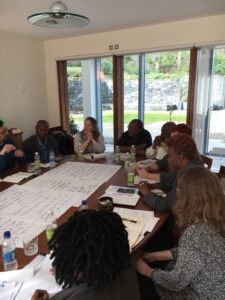 Our intensive meeting time closed with a conversation about common concepts we were taking away and next steps in managing the process and identifying funding partners who would be needed to move the idea forward. As the week came to a close, I left with gratitude for what had been accomplished. I also left with questions about what it will take for us organizationally and individually to move in the direction that we charted. It didn’t seem appropriate at this gathering to explicitly encourage reflection and sharing on a personal level about what each person needed to bring leadership to a process that would mean significant change in business as usual or what our challenges might be in moving forward – especially vis-à-vis the systems in which we were located. However, moving forward will require a whole lot of stamina, courage, creativity, good will, patience and faith from everyone involved. Sharing power with the communities doesn’t happen easily even if it means effective development and thriving communities will result. There will need to be special, intentional effort to overcome obstacles in moving the process forward while remaining firm about the centrality of community voices and initiative in this planning process.
Our intensive meeting time closed with a conversation about common concepts we were taking away and next steps in managing the process and identifying funding partners who would be needed to move the idea forward. As the week came to a close, I left with gratitude for what had been accomplished. I also left with questions about what it will take for us organizationally and individually to move in the direction that we charted. It didn’t seem appropriate at this gathering to explicitly encourage reflection and sharing on a personal level about what each person needed to bring leadership to a process that would mean significant change in business as usual or what our challenges might be in moving forward – especially vis-à-vis the systems in which we were located. However, moving forward will require a whole lot of stamina, courage, creativity, good will, patience and faith from everyone involved. Sharing power with the communities doesn’t happen easily even if it means effective development and thriving communities will result. There will need to be special, intentional effort to overcome obstacles in moving the process forward while remaining firm about the centrality of community voices and initiative in this planning process.

